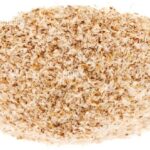Dear Readers, Lupins are much more than just brightly flowering summer plants that beautify our gardens. This native legume has the potential to become the plant of the future. It is rich in protein, environmentally friendly, and extremely healthy.
Find out here why lupins even compete with soybeans and what other advantages they have.
The native lupine could become an important food for the society of the future. It is one of the few protein-rich and environmentally friendly alternatives to soy and meat products.
Nevertheless, the food industry is only slowly getting to grips with the seeds. Below you will find out what lupins actually are.
Interesting facts about lupins
They bloom in pink, blue, and purple and adorn many summer meadows and gardens with their extraordinary appearance.
What is less well known, however, is the fact that lupin seeds are excellent as a food and, above all, as a source of vegetable protein.
From a botanical point of view, lupine is a legume, just like peas and soybeans.
The small seeds that are found in the three to seven-centimeter-long pods of the sweet lupine are edible.
They must first dry in the field before they are harvested using a combine harvester.
Unfortunately, lupins are still rarely used in the food industry, although the legume was already an important source of protein for our ancestors many centuries ago.
The ancient Egyptians used lupins as early as 2,000 years before Christ; for them, the legume was at least as important as grain. Old scrolls from our ancestors in the Mediterranean region also report on the lupin plant.
What is special about the lupine is its ability to form a deeply branched root network, which enables the plant to absorb a high amount of nutrients from the soil. It also binds enormous amounts of nitrogen from the earth.
Thanks to these properties, high levels of fertilizer use in agriculture are no longer necessary.
Ingredients of sweet lupins
Lupins are still underestimated, and that’s completely unjustified. But just a glance at their ingredients reveals that the small seeds can easily keep up with other superfoods.
Lupine seeds provide important vitamins, and macro- and micronutrients. Thanks to the high bioavailability and digestibility of the seeds, sweet lupins can be an ideal addition to a balanced diet.
Macronutrients
The protein contained in sweet lupins is particularly interesting, as these power seeds consist of up to 35 percent of vital proteins.
For comparison: the meat alternative soy contains up to 39 percent protein – so domestic lupins are in no way inferior to exotic soy in this respect.
In addition, lupin protein is particularly high quality: it contains all eight essential amino acids that must be ingested through food.
A protein-rich diet supports new cell growth and tissue repair – for example after sore muscles.
But that’s not all. In contrast to soy, lupin seeds are extremely low in fat: the fat content of soy is almost 20 percent. Lupin seeds, on the other hand, have only 6 percent fat. The majority of this is monounsaturated and polyunsaturated fatty acids.
Unfortunately, lupins are not low in carbohydrates but they do have fairly high fiber content. This not only has a positive effect on blood sugar levels but also keeps you full for longer and promotes digestion.
Vitamins
In addition to many minerals, fiber, and proteins, the small power seeds also contain numerous vitamins. For example, they owe their yellow-to-orange color to the carotenes.
Unfortunately, lupins are not low in carbohydrates but they do have a fairly high fiber content. This not only has a positive effect on blood sugar levels but also keeps you full for longer and promotes digestion.
Vitamins
In addition to many minerals, fiber, and proteins, the small power seeds also contain numerous vitamins. For example, they owe their yellow-to-orange color to the carotenes.
Unfortunately, lupins are not low in carbohydrates but they do have fairly high fiber content. This not only has a positive effect on blood sugar levels but also keeps you full for longer and promotes digestion.
Vitamins
In addition to many minerals, fiber, and proteins, the small power seeds also contain numerous vitamins. For example, they owe their yellow-to-orange color to the carotenes.
For example, so-called phytoestrogens. They are found particularly in soy products and are said to be responsible for the fact that women in Asian countries suffer less from estrogen-dependent cancers, menopausal symptoms, and cardiovascular diseases.
However, soy products are far ahead of lupin seeds when it comes to phytoestrogens. They contain almost 50 times as many phytoestrogens as domestic lupin seeds.
Benefits and effects of sweet lupins
Thanks to their healthy combination of nutrients, trace elements, and vitamins, sweet lupins are a true enrichment for your health.
But it is not only our bodies that benefit from the small seeds.
Below you will find out why lupins could become an important food in the future.
Lupine seeds as a meat substitute
A meat-based diet usually provides a lot of protein, which, among other things, promotes muscle growth.
However, if you want to avoid animal products but not a protein-rich diet, lupin seeds are an ideal alternative.
Although lupin seeds contain as much protein as various types of meat, they contain significantly less purine.
These are broken down in the body into uric acid, which is by no means harmful in moderation.
However, daily and high consumption of meat, especially offal, can quickly exceed the normal value. The consequences include gout attacks and kidney problems.
A nice side effect is that lupins only require a fifth of the area that a cow would otherwise take up with the feed it needs.
Low-calorie fat substitute
It is not without reason that lupin seeds are increasingly being tested as a vegan fat substitute. They have a lower fat content than soy, for example, and are low in calories, while at the same time having a similarly creamy consistency to fat.
For example, you can make vegan ice cream from lupin seeds. However, there is one disadvantage: unlike animal fat, lupin does not impart any flavors.
Alternative to soy products
People who follow a vegetarian or even vegan diet often rely on soy products to ensure that their bodies get enough protein, for example. Soy has so far been the alternative to meat products.
However, the exotic soybean also has its downsides. Among other things, it is responsible for the deforestation of rainforests and requires long transport routes before it finds space on our supermarket shelves.
Lupin seeds have a significantly lower carbon footprint than their plant-based alternative, partly because they are native to this country.
For healthy intestinal flora
But it’s not just vegans and vegetarians who can benefit from sweet lupins. Anyone who wants to improve their intestinal health with the right foods can use lupins.
Their high fiber content of around 15 percent has a positive effect on health. Among other things, the fiber promotes intestinal transit and prevents colon cancer. Lupine seeds also have a prebiotic effect.
They serve as a source of food for the good bacteria in our intestines (which, among other things, maintain a healthy intestinal flora). As a result, lupins promote the bacterial balance of the intestines, which ultimately has an effect on our overall well-being.
Improve blood lipid levels
Studies at the University of Halle have shown that the soluble fiber in sweet lupins has another important property: it is said to be able to lower total cholesterol levels. However, it does not affect the good HDL cholesterol.
The fiber in lupins binds bile acid and supports its excretion from the body. This in turn stimulates the body to produce new bile acid, for which it needs cholesterol, among other things. This lowers cholesterol levels and improves blood lipid levels.
Environmentally friendly and good for the soil
Sweet lupins grow even in poor soil conditions and tolerate both frost and heat.
The deep root network with meter-long taproots enables the lupine to obtain nutrients and water even from greater depths.
Among other things, this makes regular fertilization of the plants unnecessary: an interesting feature – especially for organic farming.
In addition, lupins are a real soil improver because they bind nitrogen from the soil with their roots. Last but not least, there are no genetically modified varieties of lupins, as is the case with soya, for example.
Risks of lupins
Sweet lupins are completely safe for healthy people and have no significant side effects.
However, there are two aspects of lupins that you should consider before consuming them.
You will learn what these aspects are and what the ingredients of lupins can do in the following subchapters.
Toxic alkaloids
Wild lupins should not be consumed under any circumstances. The reason for this is the alarming amount of poisonous bitter substances that contain alkaloids. If these are consumed, it can lead to serious digestive problems.
In addition, these bitter substances can have a serious impact on the nerves, cause circulatory problems, and even respiratory paralysis. But these serious side effects only apply to wild lupins.
Sweet lupins, on the other hand, have been specially bred so that they no longer contain any alkaloids. It is therefore important for you not to start any self-experiments and harvest the seeds from nature, but only to buy lupin products available on the market.
Not for nut allergy sufferers
Lupin seeds are gluten, lactose, and cholesterol-free, so while they are a wonderful addition to the diet of some allergy sufferers, some people should be more careful.
People with a nut allergy may have an allergic reaction to the seeds. Peanut allergy sufferers are particularly affected.
Lupin flour
If you want to bake gluten-free and healthy, you should try using lupin flour.
The wheat flour alternative makes bread dough particularly smooth and binds the dough excellently. The flour also has a slightly nutty taste and hardly any starch.
However, when baking with lupins you should note that the product can become very solid if only sweet lupin flour is used.
The best thing is to mix different flours together.
Lupin protein as a meat substitute
In food production, the protein of sweet lupins is pressed into a fibrous mass. This can then be used to make so-called meat substitute products, which are currently mainly based on soy.
But the lupine business is becoming increasingly popular: the seeds are used to make vegan Vienna sausages and sausage spreads, among other things. Vegan yogurt, ice cream and cream are now even being made using the plant-based alternative.
Lupine milk
The market for plant-based alternatives to conventional milk is growing rapidly. Not only is there now soy milk, oat milk, almond milk, and many more. Lupins can also be processed into the popular drink.
The seeds are soaked for eight hours and then finely ground. This creates a liquid pulp, which is then squeezed out: the lupine milk is ready.
It is rarely found in conventional supermarkets, but the online offering is much larger.













You mentioned about alot of health benefits of lupins. Keep up the good work.